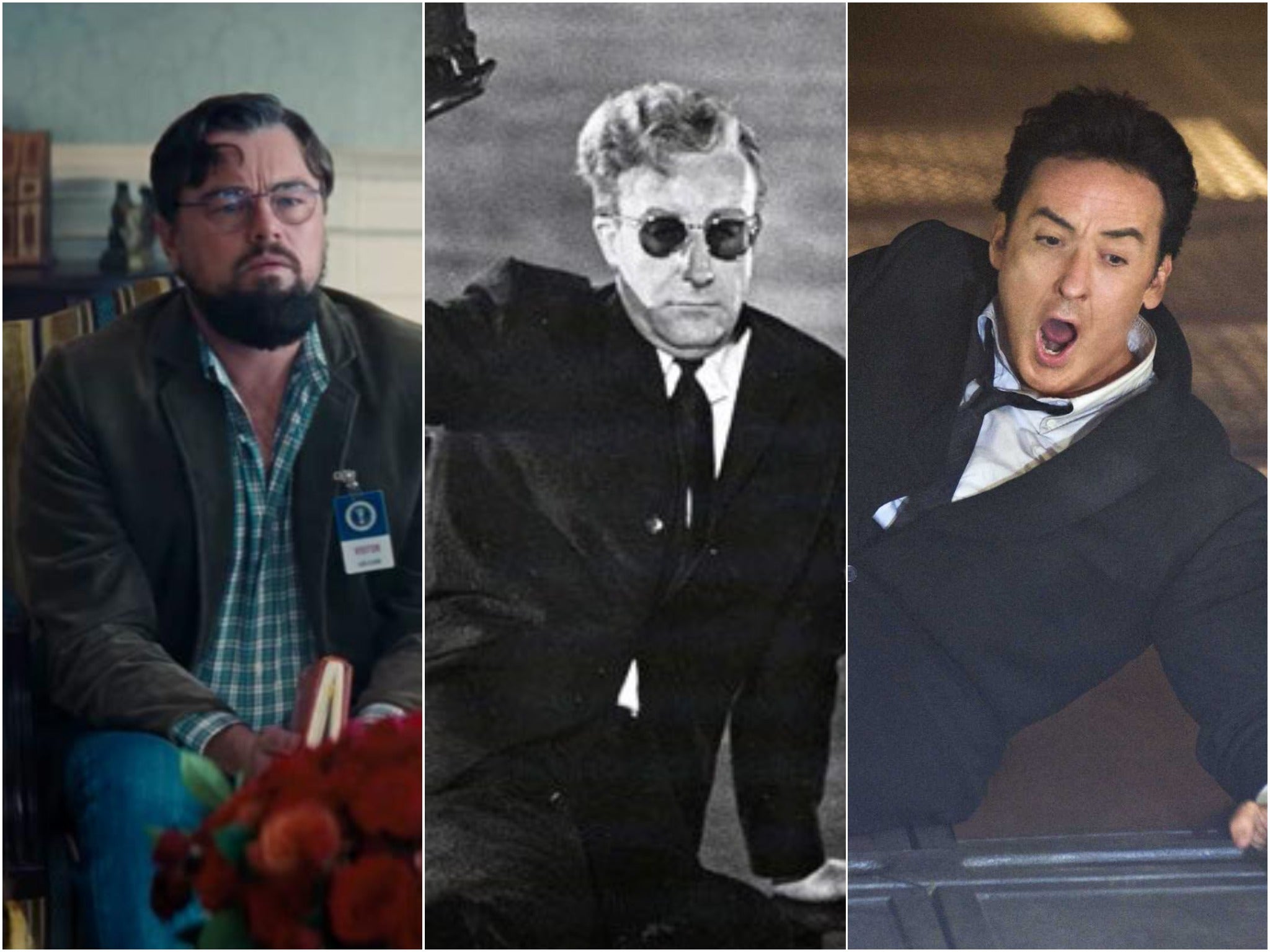The Independent's journalism is supported by our readers. When you purchase through links on our site, we may earn commission.
Don’t Look Up: Adam McKay’s condescending doomsday satire doesn’t hold a candle to Dr Strangelove
In fact, the film starring Leonardo DiCaprio isn’t even half as fun and spirited as the audacious Roland Emmerich blockbuster ‘2012’, argues Maanya Sachdeva


Has there been a more polarising Hollywood film this decade than Don’t Look Up? Adam McKay’s star-studded climate crisis satire follows two frustrated astronomers – Leonardo DiCaprio and Jennifer Lawrence – as they try to get people to care about a planet-killing comet on a collision course with Earth. It’s already Netflix’s third-most watched film, and its most successful project ever. To some, it’s a brilliant allegory for climate apathy, teeming with sharp performances and hilarious gags. To others, it’s a condescending exercise in self-congratulation, a harangue you can hear from outer space. I belong to the latter camp.
The brash, on-the-nose doomsday flick isn’t even half as fun and spirited as 2012, “Master of Disaster” Roland Emmerich’s larger-than-life cinematic interpretation of Judgment Day, which experienced a surge in popularity at the beginning of the pandemic in 2020. But far superior in every way is 1964’s Dr Strangelove or: How I Learned to Stop Worrying and Love the Bomb, in whose mushroom-clouded shadow Don’t Look Up exists.
“People react, as a rule, when they are directly confronted with events,” director Stanley Kubrick said while promoting Dr Strangelove, a disaster comedy set against the backdrop of the Cold War. The film sees a deranged United States air force general order a first strike nuclear attack on the Soviet Union over the alleged contamination of “our precious bodily fluids” by communists. While its plot was initially discredited as “impossible on a dozen counts”, it has since been accepted that lower-ranking American military officers could, indeed, have started a nuclear war in the Fifties. Its sparkling treatment as satire, and nuanced, comic performances, made the truth easier to digest, with the film’s exaggerated doomsday scenario even triggering international policy reform as early as the mid-1960s. “Laughter can only make people a little more thoughtful,” Kubrick continued, on the subject of the film’s influence, in an interview with The New York Times before Dr Strangelove was released.
Kubrick’s maxim has applied to apocalyptic and post-apocalyptic films produced by Hollywood in the years since. Humour has been employed to distance viewers from a possible end of the world scenario, while still drawing them into a world of impossible images. Unimaginable natural calamities that rock August Blom’s 1916 Danish sci-fi drama The End of The World, Emmerich’s total annihilation of planet Earth in films like The Day After Tomorrow and Godzilla, or even scenes of post-apocalyptic wreckage in the 2008 animated Pixar feature Wall-E, were all warnings of a terrifying tomorrow – until McKay decided that the present day was disastrous enough to inspire his 2021 end-of-the-world satire.
In Don’t Look Up, science is stifled by the lethal combination of political ambition, clickbait news, divisive social media and greed. Sure, it mirrors reality in 2021, but by hiding behind the comet, the film remains non-committal. Where Dr Strangelove launches a targeted attack on nuclear deterrents and the irony of maintaining a doomsday machine that can end the world, Don’t Look Up is more open to interpretation. One viewer might liken the mountainous comet to the ongoing Covid-19 pandemic, another to climate change (as McKay intended), and a third still to the space race. At various points since 2020, multiple people (including former US president Donald Trump) have downplayed or entirely dismissed the threat of Covid – much like the comet-deniers in Don’t Look Up. When we’re already living through what feels like the end of the world – simultaneously fractured both by a highly transmissible coronavirus and the consequences of global warming – doomsday satire is harder to laugh about. As such, the depressing devolution of humanity has been parodied ad nauseumby everyone from sketch comedy writers to meme-maker; we may even have reached maximum saturation.
Perhaps its timing was off, and Don’t Look Up will attract renewed interest after the pandemic has passed – the kind 2012 drew during the early days of Covid, a decade after it was first released. Capitalising on the hype around the predicted end of the world on 21 December 2012, Emmerich’s blockbuster hit is ultimately about one man’s desire to protect his loved ones in the face of cataclysmic events. As California-based sci-fi writer Jackson Curtis (John Cusack) embarks on a mission to save his family on Earth’s last day, 2012 was positively thrilling to rewatch in 2020, when most people around the world were still languishing in lockdown and facing an uncertain future. Admittedly, the science behind 2012 is dubious; Nasa criticised it as the most “scientifically flawed movie” made in recent times. However, what it lacked in scientific backbone, it made up for in spirit.
Embodied by Cusack’s character against an eye-popping VFX budget, spirit carries the “mother of all disaster films” despite its lengthy running time, where Don’t Look Up stretches glumly past the two-hour-20-minute mark. Curtis’s determination to protect his loved ones in the face of towering floods, angry volcanoes, and devastating earthquakes is equal parts hair-raising and heartwarming – making it an effective antidote to the everyday ennui that has permeated life in the time of Covid. “It’s the characters which make it fun and light,” Emmerich mused in an interview with The Guardian in 2009, adding, “I always think that, even in the face of disaster, people are funny in spite of themselves.” Emmerich, who has frequently toyed with the idea of large-scale planetary devastation over his career, balances the terror and humour of an imagined apocalypse in ways that few of his contemporaries have managed.
He offsets large-scale destruction with quieter personal moments, making relationships the focus of what he says is ultimately a “Noah’s Ark” story. It’s got all the disaster film staples: shock deaths, an epic getaway, redeeming personal sacrifices made by cowardly characters, and a soppy reunion with an ex-wife (played here by Amanda Peet). In his surprisingly favourable review of 2012 – most critics slammed the film for being over the top at the time – Roger Ebert wrote that it “delivers what it promises, and since no sentient being will buy a ticket expecting anything else, it will be, for its audiences, one of the most satisfactory films of the year”. 2012 became the fifth highest-grossing movie in 2009, earning over $769m in worldwide box office collections. Then, the rise of streaming platforms and on-demand entertainment gave 2012 a freak second chance – almost as unlikely as the gaping chasm that swallowed a quarter of Los Angeles’ population in the film. The Netflix title was reintroduced into national and international consciousness two years ago, indicating that this audacious treatment of the end of the world had been elevated to cathartic viewing.
Given the anti-climactic experience of watching real and reel life bleed into each other in Don’t Look Up last year, Emmerich is now well positioned to reclaim the disaster movie market with his forthcoming film Moonfall. Out next month, the film teases a mysterious force that knocks the moon from its orbit around Earth, and sends it hurtling on a collision course with life as we know it. Spoiler alert: there’s no trace of the impending global climate crisis in the trailer.
Join our commenting forum
Join thought-provoking conversations, follow other Independent readers and see their replies
Comments
Bookmark popover
Removed from bookmarks